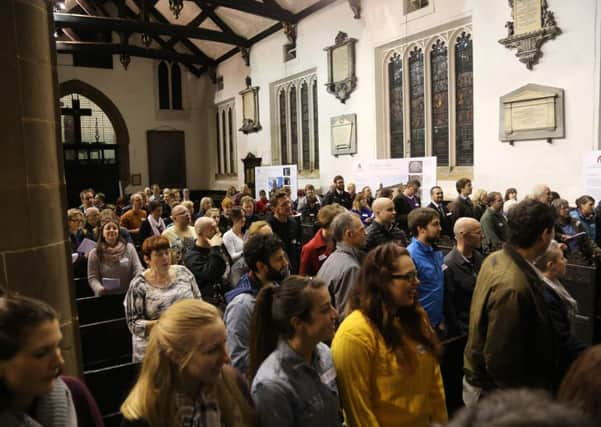The modern congregation that sings praise of both secular and spiritual


FOR many religious observers, the idea of a church without God is like making an omelette without eggs – it doesn’t make sense.
But for members of the newly-formed Sunday Assembly, the idea of a church community without the requirement of faith is quite appealing. Their aims are simple – to live better, help often and wonder more.
Advertisement
Hide AdAdvertisement
Hide AdThe Sunday Assembly was formed in London in January this year by Sanderson Jones and Pippa Evans as a non-religious gathering for people seeking the communal experience of church, but who lack religious belief or don’t belong to any organised religion.


Inspired by what they saw, co-organisers Chris Osborne and Ian Bushfield approached Sanderson and Pippa with the idea of setting up something similar in Leeds.
“We want to build a community that anyone can be a member of, there’s no entry requirements – you just have to be prepared to ponder life, do some good and get involved,” says Chris.
“We want to come together to celebrate the one life that we know we have.
Advertisement
Hide AdAdvertisement
Hide Ad“The big questions like ‘why am I here?’ really do keep people awake at night,” he says.
“Whereas a few hundred years ago they may have spoken to a priest and found reassurance, a lot of people today miss that and a lot of people feel really isolated because there’s nowhere to turn.”
In less than a year, the idea has become a worldwide movement, with Sunday Assemblies cropping up across the UK, America, Australia and beyond.
“We’re not saying to people that they’re not going to heaven, or that Allah isn’t real, and we’re not saying to people that they shouldn’t be a Hasidic Jew – what we’re saying is that if you feel isolated but don’t feel like you fit into a religious community we’d like to hang out with you,” says Chris.
Advertisement
Hide AdAdvertisement
Hide AdThe group prides itself on not trying to compete with other religious groups, and says that anyone is welcome to attend.
“Our doors are open to everyone,” says Ian. “We get together to talk about the things that we know – we know that there’s at least one life, and we should enjoy it while it’s here.
“As a group we’re focused on the here and now, and trying to encourage other people to do that.
The Sunday Assembly had its first meeting in Leeds last month and attracted over 120 people, which isn’t a bad turnout.
Advertisement
Hide AdAdvertisement
Hide Ad“We sing rock and pop songs instead of hymns, we have moments of quiet reflection instead of prayer, instead of a sermon we have an interesting talk – something thought provoking,” says Michelle Beckett, who sits on the organising committee for the Assembly.
“We’ve had great feedback from people on Facebook and Twitter saying it was really uplifting,” she adds.
The word ‘atheist’ comes from the ancient Greek word meaning ‘without God’, so in a sense describing the Sunday Assembly as an ‘atheist church’ seems fitting, but it is not without its problems.
The Assembly does not preach against the existence of God, nor does it take shots at other people’s beliefs.
Advertisement
Hide AdAdvertisement
Hide Ad“The Press have coined the term ‘atheist church’ which is useful as a starting point, but it’s not strictly true,” says Michelle.
“We’re actually quite far removed from atheism – it just so happens that we don’t mention God or the supernatural.
“There’s no pushing of atheism – as you’d get with someone like Richard Dawkins. We want to get as far away from that as possible – we’re more inclusive than that,” she says.
“We don’t get together to bash religion or anything like that,” adds Ian. “Many of our members are ex-Christians who miss the feeling of community you get in a church and just like the idea of getting together and celebrating life.”
Advertisement
Hide AdAdvertisement
Hide AdIndeed, the idea of creating an inclusive community that doesn’t put conditions on its members is at the heart of the Sunday Assembly’s ethos.
“We wanted to bring an unconditional sense of community,” says Michelle. “Other groups tend to be formed around hobbies, sports or other interests – that can be quite exclusive. Unless you have those shared interests, you can’t really get involved.
“We wanted to bring together a real mix that reflects the entire community and provide unconditional support.”
There is a strong moral aspect to the church which is focused on doing good things, with a strong emphasis on charity.
Advertisement
Hide AdAdvertisement
Hide Ad“We can say, hand on heart, that we are trying to make lives better for ourselves and other people,” says Michelle.
“In a selfish way, doing good makes you feel happier. If you do good and help other people it can give you a real boost,” she adds.
The Sunday Assembly is not just for adults, and the group has plans as the organisation grows to incorporate a Sunday school to enable young people to explore ideas about themselves and the world around them.
“It’s a family-friendly event – we’re not saying we’re providing childcare or anything, but that’s certainly a focus,” says Ian.
Advertisement
Hide AdAdvertisement
Hide Ad“When we grow, we really want to start putting on more child-focused events. It’s not about telling children what to think, but we do want to encourage them to ask questions and let them come to their own conclusions about things,” he adds.
“There’s a real focus on science and psychology at the moment on how to be happy,” says Michelle. “If we can give children and teenagers those seeds growing up, I think that could be a really good thing.
“We want to give young people things to think about that they might not necessarily get in schools,” she adds.
Like many Christian churches, the Sunday Assembly will be holding a service this December to celebrate Christmas.
Advertisement
Hide AdAdvertisement
Hide Ad“People have asked me over the years why I celebrate Christmas even though I’m an atheist, and my answer is always ‘why not?’ – it’s great fun,” says Michelle
“I love putting my tree up and giving my kids presents, eating mince pies, playing family games and thinking about charity – that’s what it’s about to me.
“Christmas for most families is more of a secular festival anyway. Christmas was hijacked by the Christians from the Pagan winter festival, and it’s been hijacked again in recent years as something more secular and commercial,” she says.
“For a lot of people now, Christmas has become about rest, food and family. I’m planning on wearing a red dress and bauble earrings for our December service.”
Advertisement
Hide AdAdvertisement
Hide AdIan agrees, believing that Christmas can be a celebration of family and sharing – and what better way to celebrate than by singing some cheesy Christmas songs?
“There are lots of songs about coming together and celebrating that aren’t about a religious Christmas, but a family Christmas,” he says. “I think we’ll sing some of those songs because they’re quite fun.”
For all its good intentions the Sunday Assembly has been hindered by media perceptions which the church’s organisers have encountered when trying to explain in simple terms what it is they do.
Terms like ‘atheist church’ or ‘Godless church’ conjure up negative images in some people’s minds which can lead to misunderstanding.
Advertisement
Hide AdAdvertisement
Hide AdThe group is probably best described as a gathering of well-meaning people who want to play an active role in their communities, and do good things and at the same time celebrate the best that humanity has to offer.
What seems clear is that the Sunday Assembly looks like it will continue to grow, and for many members of society it could provide a much-needed sense of support and community.
In the grand scheme of things perhaps anything that advocates such values ought to be applauded.
For more information about the Sunday Assembly and to find out about their next meeting visit www.sundayassemblyleeds.com.
Atheism: A Broad Church
Advertisement
Hide AdAdvertisement
Hide AdThe first Sunday Assembly was held in London in January this year.
Since its first service, the group now has spin-offs across the UK including groups in Leeds, Manchester, Nottingham, Glasgow, Liverpool and Newcastle.
There are also Sunday Assemblies cropping up across the world in cities including New York, Dallas and Chicago in America, Vancouver in Canada, and Sydney in Australia.
In total, there are currently 40 groups around the world and growing.
The group uses online social media to spread its message and now has more than 5,500 Facebook members, as well as more than 3,325 followers on Twitter.